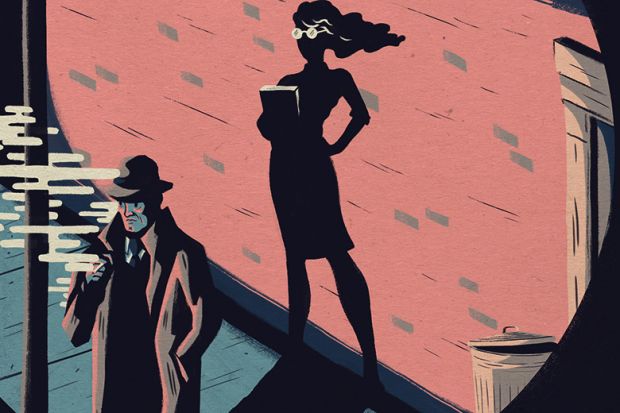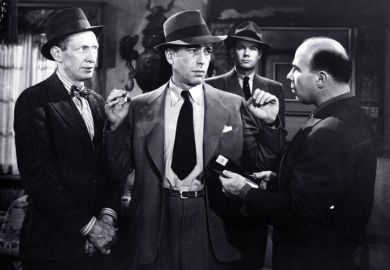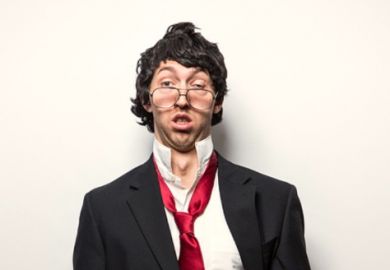My first P. D. James novel was Death in Holy Orders. It sat innocently on a shelf in a small library where I was wrestling with my dissertation. Within days, I had to switch libraries to avoid it or I would get no work done. Not only did the book have everything I could want in a crime novel (a landscape, a school, architecture and a likeable, learned detective), it had Emma Lavenham: a kind, brilliant, beautiful professor of English literature. Inspector Adam Dalgliesh meets her twice and feels his heart lurch. One night, at a loose end, Emma utters a sentence that I knew defined the academic life I was heading into: “She could work. There was always work.” Already that was something we shared. As a postgraduate, I wished to be her, despite the thinness of her characterisation.
Or perhaps it was because of that. The thinness makes Emma powerful: her appearances lack all the tedium of real academic life: micromanagerial assessment metrics, late essays, nasty book reviews. Instead we get a mandorla of romantic glamour around her scholarly dedication. Emma’s intellect calls forth the most honourable aspects of Dalgliesh’s character. Through her, James suggests that the noblest match for a clever literary detective is someone who is herself devoted to literature – her own form of holy orders.
My literary crush on Emma subsided, but as my devotion to detective novels grew, I became accustomed to the academic as muse – the professor whose commitment to scholarship mirrors the detective’s commitment to crime-fighting, and whose cleverness endorses his. The most developed example I know of this sort of couple lives in Venice: Donna Leon’s Guido Brunetti and Paola Falier. Paola, like Emma, teaches English literature. She reliably ignores husband, children and kitchen whenever she opens a book. Her fierce devotion to literature makes her the kind of spouse who can share a sofa and a bottle of wine with her husband for hours, neither of them speaking – she with her Henry James and Brunetti with the volumes of Aeschylus that soothe the corrupting wounds of his police job. But literature also gives Paola angry moral vigour, pushing Brunetti back towards the side of justice whenever he wavers.
Over in Quebec, Louise Penny’s Armand Gamache is an older, stouter, kinder, more-moustachioed Brunetti. His wife, Reine-Marie, is a gentler Paola – and a librarian at Montreal’s Bibliothèque Nationale. Occasionally, Reine-Marie’s archival skills or academic connections help a case; invariably, her quiet librarian wisdom keeps her husband grounded.
This paradigm, where the life of the mind offsets the grittiness and gore of detective work, is virtue-signalling of the highest order. The cerebral academic elevates the detective above the moral swamp where he works, saving his soul. As a result, his basic decency and his romantic fidelity must be fully intertwined. Other detectives play the field, but these men can’t. Everything best about them is encapsulated in their love for an intellectual woman. They would lose their greatest professional advantage if they cheated, and readers would leave them.
It’s well known how much academics love detective fiction. That’s surely in part because it coddles the academic ego; we like having a clever protagonist whose greatest asset is intelligence. And with detectives such as Dalgliesh, Brunetti and Gamache, we get to identify with the beloved, and with the characters who represent and signal virtue. I asked on Facebook one evening for more examples of detectives who fall in love with academics. The next morning, I woke up to a lively debate, involving friends I hadn’t heard from in years. The academic types, no surprise, had the strongest opinions. I’ve learned that Robert B. Parker, creator of the Boston detective known as Spenser, had first been a professor of English (yes, focusing on detective fiction), and I have been introduced to the marvellous Jane Langton and her sparkling tongue-in-cheek set-pieces, featuring a professorial ex-detective and inevitably, his wise scholarly wife, Mary.
I love these novels as much as anybody, but I admit that much of their comforting appeal relies on the cliché embedded within all the gory action: a beneficent, static picture of both love and academia – particularly literature. This isn’t the only model of campus mystery or academic-detective romance, but it’s unusually entrenched. I began to wonder why it seems so common, especially in novels by brilliant women featuring male detectives.
My first stab at a hypothesis lies back in that Facebook discussion. Most of my interlocutors, British and American, pointed insistently in one direction: Dorothy L. Sayers’ Harriet Vane novels, which I had not yet read. These present the opposite of every trope about detectives and academics I’ve mentioned thus far, culminating in the moral dilemmas of Gaudy Night. Should Harriet throw her lot in with the detective, Wimsey, or pursue literature above all else? Can she have both? Can any woman? Might the academic life wither the soul? And on the other hand, can anyone engaged in any kind of intellectual holy orders be a true partner, much less a muse, without being wholly consumed?
This ground is well trodden and sacred to many. Indeed, one friend even warned me that if I didn’t enjoy Gaudy Night, “we may never be able to speak again”. (Spoiler: we’re fine.) So let me offer instead only one speculation: that later novels do not so much shy away from Sayers’ difficult questions as pay homage to them. In making Vane Wimsey’s true partner and collaborator, Sayers proposes that an academic can best rival the detective at his own game. Perhaps it is directly in her wake (I haven’t asked them) that these authors have created for their own detectives a marriage of true minds. Lucky us – they let us imagine having the best of both worlds.
Emily Michelson is senior lecturer in history at the University of St Andrews.
POSTSCRIPT:
Print headline: Cops and scholars
Register to continue
Why register?
- Registration is free and only takes a moment
- Once registered, you can read 3 articles a month
- Sign up for our newsletter
Subscribe
Or subscribe for unlimited access to:
- Unlimited access to news, views, insights & reviews
- Digital editions
- Digital access to THE’s university and college rankings analysis
Already registered or a current subscriber?





